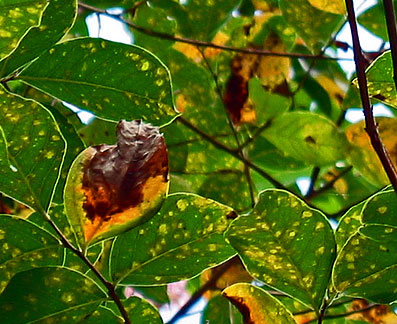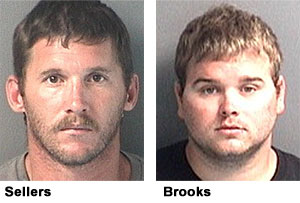Weekend Gardening: Spots On Your Crape Myrtles Can Be A Problem
July 20, 2013
 As the heat and humidity increases in Northwest Florida, expect to see some diseases appear in the landscape. One problem that is popping up on crape myrtles is Cercospora leaf spot. While not a deadly problem, it can greatly detract from the beauty of crape myrtles.
As the heat and humidity increases in Northwest Florida, expect to see some diseases appear in the landscape. One problem that is popping up on crape myrtles is Cercospora leaf spot. While not a deadly problem, it can greatly detract from the beauty of crape myrtles.
The initial symptom on crape myrtles is the appearance of tan to dark brown spots randomly scattered on yellow to red discolored leaves. The spots develop first on the lower leaves and progress upward in the canopy. Spots will continue to develop from mid-summer through fall. The color change is due to the production of a toxin by the fungal pathogen.
Infected leaves will drop prematurely and serve as a source to spread the pathogen causing further disease development. As the summer progresses, many infected trees will have dropped all but the newest leaves.
Older varieties of crape myrtles are more susceptible to this disease than newer varieties. The crape myrtle varieties most tolerant to Cercospora leaf spot are Natchez, Muskogee, Basham’s Party Pink, Sioux and Tonto.
Long term, this disease is not detrimental to a tree, although it will slow down growth on younger plants. Plants growing in conditions that are not ideal will be more affected by the leaf spot disease.
The best control is selecting a planting site with good air circulation so that the foliage will dry quickly. Thinning interior branches will also promote air flow.
 The use of fungicides to control this disease has not been very effective because they would have to be applied repeatedly on a regular basis throughout the growing season. If used, fungicide applications should be started in early summer when the spots are first noticed and continued at one to two week intervals when the weather is warm and wet. Consult your local Extension office for fungicide recommendations.
The use of fungicides to control this disease has not been very effective because they would have to be applied repeatedly on a regular basis throughout the growing season. If used, fungicide applications should be started in early summer when the spots are first noticed and continued at one to two week intervals when the weather is warm and wet. Consult your local Extension office for fungicide recommendations.
As always, be sure to read and follow all label directions. Fungicides can be classified by how they work on the fungus or how they work on the plant. Products that work in a similar way on fungi have the same mode of action (also referred to as chemical family or class).
Contact fungicides are sprayed onto plants and act as a protective barrier from pathogen infection. They prevent infections from occurring when applied before symptoms are visible, but infections that have already occurred will continue to develop.
Systemic fungicides move into the plant, but movement inside the plant is limited. The vast majority of fungicides only move upward in the plant vasculature, but not down. Some fungicides only move locally into the plant part treated. Some systemic products exhibit curative action, which means the disease is stopped during its development. For managing fungicide resistance, products with different modes of action should be used in rotations.
Since this disease will result in early defoliation or the loss of leaves, it is critical to practice good sanitation. Raking and destroying fallen leaves should be a routine practice in order to prevent the spread of the disease.
For more information, contact Theresa Friday at 850-623-3868 or email tlfriday@ufl.edu. Friday is the Residential Horticulture Extension Agent for Santa Rosa County.
Florida Gov’t Weekly Roundup: Students Stand Their Ground, Testing Students
July 20, 2013
Florida may not be gripped by a royal baby watch, but the Sunshine State continues to be on the minds of many summertime-sweltering Americans, or at least those watching cable news and unable to distance themselves from social media.
Florida found itself before America’s TV eye for another week, as reaction continued to swirl after a jury in Sanford acquitted George Zimmerman in last year’s shooting death of Trayvon Martin, a black teenager from Miami Gardens.
 Meanwhile, Florida Department of Children and Families Secretary David Wilkins left the agency to “pursue opportunities in the private sector,” after DCF faced growing criticism about the deaths of four children who earlier had come to its attention.
Meanwhile, Florida Department of Children and Families Secretary David Wilkins left the agency to “pursue opportunities in the private sector,” after DCF faced growing criticism about the deaths of four children who earlier had come to its attention.
And that was not all the fodder during a normally slow-paced period in Tallahassee.
A divided state Board of Education, after a debate about the validity of grades issued annually to schools, approved a plan that will shield schools from steep drops this year. At the same time, legislative leaders want the state to come up with a “Florida Plan” for educational testing.
Oh, and it was announced Thursday that Florida’s unemployment rate held at 7.1 percent in June.
STUDENTS STANDING THEIR GROUND
After three days on the road in New York, Pensacola, Tampa and Bradenton, Gov. Rick Scott flew back to Tallahassee on Thursday to meet with student protesters seeking to overturn the 2005 “stand your ground” law.
But the protesters, led by a group called the Dream Defenders, didn’t like that Scott refused to budge in his support for the law. So they remained camped outside Scott’s first floor office on Friday, their fourth day on the stone floor, equipped with pillows and blankets in preparation for a weekend inside the Capitol.
While Zimmerman didn’t invoke “stand your ground” in declaring he acted in self-defense when shooting Martin, the law has been heavily debated during the racially charged case.
“So you’re telling me — again — that people who look like me, we don’t matter,” said Shamile Louis, 21, a student at the University of Florida who came from Gainesville to participate. “Our bodies don’t matter. We can lie in the street and be dead and it’s cool. I had a friend killed about a month ago in Orlando. Still no arrest. Still no nothing. Another black man gone. Another young black boy without a father.”
Democratic lawmakers across the state have offered support for the students’ sit-in. Meanwhile, legendary musician Stevie Wonder and liberal groups such as Moveon have called for boycotts of Florida tourism and orange juice.
U.S. Attorney General Eric Holder strongly criticized the “stand your ground” law Tuesday while addressing an NAACP convention in Orlando, and President Barack Obama chimed in Friday.
“You know, when Trayvon Martin was first shot, I said that this could have been my son,” Obama said. “Another way of saying that is, Trayvon Martin could have been me, 35 years ago.”
Scott maintains there is no reason to call the Legislature to Tallahassee for a special session on the law.
“I told them that I agree with the Task Force on Citizen Safety and Protection, which concurred with the law,” Scott said in a release after the meeting, referring to a task force formed after the shooting. The Republican-controlled Legislature did not take action this year on proposals to change the law.
WHO IS WATCHING THE DCF?
The Department of Children and Families is in flux.
Esther Jacobo, the managing director for DCF’s southern region, was named interim secretary after Wilkins, Scott’s longest-serving agency head, stepped down Thursday.
Wilkins struggled to implement a new child protection initiative that he said would “transform” DCF. But the criticism of his handling of the agency steadily grew starting May 16, when the first of the four children died. All four had had contact with DCF abuse investigators before their deaths, and critics contended the deaths could have been prevented.
Sen. Eleanor Sobel, D-Hollywood and chairwoman of the Senate Children, Families and Elder Affairs Committee, was preparing to hold a hearing on the children’s’ deaths and what she called the “turmoil” at DCF.
Wilkins didn’t aid his own cause as he clashed with people running the state’s 19 community-based care organizations, which deliver local child-welfare services.
Wilkins wanted to add terms to the agencies’ contracts that would give him more control — including the right to name their chief executive officers and other top staff.
Instead, the agencies fought back, recruiting lawmakers to try to rewrite part of state law that created the community-based care system, which was designed to shift many child-welfare duties from the state to local non-profit organizations
TESTING THE FLORIDA WAY
Senate President Don Gaetz and House Speaker Will Weatherford announced they want the state to withdraw from a multi-state educational consortium that has been developing new tests for students, saying they want a “Florida Plan.”
Gaetz and Weatherford would replace the work from the consortium known as the Partnership for Assessment of Readiness for College and Careers, which is developing tests that are part of the national move to “Common Core Standards.”
To the lawmakers, too many questions remain unanswered about issues such as implementation, administration, technology readiness, timeliness and costs.
The introduction of the Gaetz-Weatherford idea came after the state Board of Education narrowly approved a proposal by Education Commissioner Tony Bennett that will prevent schools from dropping more than one letter grade on their annual report cards.
The brace was proposed because school superintendents said they were concerned that this year’s grades could plummet for many schools. The superintendents pointed to repeated changes in the state’s school-accountability system — 13 this year alone — which they say have made it harder to meet standards and have created uncertainty.
Bennett said the change wasn’t a lessening of standards, but part of the transition to the Common Core Standards that are scheduled to take effect during the 2014-15 school year.
“I will hold fast that this should not be permanent and cannot be part of the permanent accountability landscape,” Bennett said.
Board member Sally Bradshaw, who opposed putting a limit on how far school grades could drop, argued the move will disguise what is happening in schools.
“Why are we going to mislead parents and the public on how their schools are doing?” asked Bradshaw.
STORY OF THE WEEK: Protesters camped out in the Capitol after the acquittal of George Zimmerman in the shooting death of Trayvon Martin. The protesters want a special legislative session on the “stand your ground” law, but Gov. Rick Scott does not plan to call such a session.
QUOTE OF THE WEEK: “If we got Chronic Wasting Disease in the state of Florida, I’d never eat another piece of venison.” – Marion Hammer, of the National Rifle Association, in support of a proposed ban on importing deer from out of state because of concerns about the spread of a disease can be fatal to the animals.
Florida Health Program Encourages Early Infant Screening
July 20, 2013
All expectant mothers agree on one thing: keeping their baby healthy during and after pregnancy is a primary focus. While new moms understand the role prenatal vitamins and healthy eating play in their child’s health, many may be unaware of the various disorders that can be prevented by a simple screening once the baby arrives. The Florida Department of Health (DOH) encourages all moms to consider how they can give their babies the healthiest life possible.
 The Department and its new health initiatives are making strides toward increasing the number of Florida’s babies that receive proper screenings for uncommon genetic, metabolic, or enzymatic defects. The Florida Newborn Screening Program is one initiative that aims to prevent impairments by screening newborns for diseases that might not be immediately apparent, but can affect a child’s development later on. The program works with affiliated organizations like Newborn Screening Lab, Children’s Medical Services, and the greater community to guarantee an increased percentage of infants screened and cured of defects such as Severe Combined Immunodeficiency Syndrome (SCIS), cystic fibrosis (CF), and, hearing loss.
The Department and its new health initiatives are making strides toward increasing the number of Florida’s babies that receive proper screenings for uncommon genetic, metabolic, or enzymatic defects. The Florida Newborn Screening Program is one initiative that aims to prevent impairments by screening newborns for diseases that might not be immediately apparent, but can affect a child’s development later on. The program works with affiliated organizations like Newborn Screening Lab, Children’s Medical Services, and the greater community to guarantee an increased percentage of infants screened and cured of defects such as Severe Combined Immunodeficiency Syndrome (SCIS), cystic fibrosis (CF), and, hearing loss.
SCIS is an immune deficiency that makes children vulnerable to dangerous infectious diseases including pneumonia and meningitis, during the early months following birth.Early treatment for the disease involves replacing a child’s immune system through blood transplants, a process which has high success rate when detected early. The same may also be said of cystic fibrosis, a genetic disorder that critically affects the lungs, pancreas, liver and intestines. Despite having no official cure, a diagnosed infant can live unaffected by the condition if it is detected and treated early.
According to the summer 2012 issue of Baby Steps, the Florida Newborn Screening Newsletter, nearly 50 percent of babies that require additional screenings do not complete the program, and are therefore unable to receive a proper diagnosis or treatment The Florida Newborn Screening Program encourages mothers to adhere to their “1-3-6” policy, which suggests babies be screened within a month of their birth, diagnosed within three, and enrolled in an early intervention program by month six, should their results require treatment. It is an initiative based on prevention, detection, and high-quality treatment services.
Haines Promoted To Escambia Chief Deputy
July 20, 2013
The Escambia County Sheriff’s Office has promoted Senior Commander Eric Haines to the position of chief deputy, effective today.
 Haines has been employed with the Sheriff’s Office since April 1999. He has previously worked in patrol, training, accreditation and has served as captain of the Uniformed Services division.
Haines has been employed with the Sheriff’s Office since April 1999. He has previously worked in patrol, training, accreditation and has served as captain of the Uniformed Services division.
Most recently, he has served as administrative commander and has been instrumental in negotiations concerning the budget and the transfer of the Escambia County Jail.
“I am happy to serve the Citizens of Escambia County,” said Haines.
In a ceremony Friday, Sheriff David Morgan also promoted Captain Tracy Yuhasz to commander. Yuhasz has been with the Escambia County Sheriff’s Office since March of 1993.
Publix Receives ‘Protector Of The Environment’ Award
July 20, 2013
ECUA recently presented their “Protector of the Environment” award to Publix Super Markets in the Pensacola area.
The POE award is a one of-a-kind initiative, which rewards local businesses and food service establishments that promote a positive, safe working and clean environment through the ECUA’s Fats, Oils, and Grease (FOG) and Backflow programs.
“We are honored by this wonderful recognition. As a reputable community partner, Publix Super Markets strives for excellence in food safety and exemplary sustainable practices,” said Dwaine Stevens, media and community relations manager for the Jacksonville district of Publix.
Jackie Gouge, Publix district manager, accepted the award that was presented by Gabe Brown, ECUA customer/FOG services manager.
The POE Award recognizes organizations that train their employees on “best management practices,” participate in scheduled 90-day cleanliness inspections, have no FOG or backflow violations, and no warnings within a one year period.
Pictured: (L-R) Gabe Brown, ECUA customer FOG service manager; Patrick Lasell, Publix store manager; Bernie Schultz, Publix store manager; Jackie Gouge, Publix district manager-Central Region/Jacksonville Division; William Gouge, Publix store manager; James Wells, Publix assistant store manager; and John Falduti, Publix assistant store manager. Submitted photo for NorthEscambia.com, click to enlarge.
Second Dog Involved In Nokomis Attack Is Captured
July 19, 2013
The second pit bull involved in a vicious attack on a Nokomis woman early yesterday morning has been captured.
The dog returned to the residence on Jakes Road just before 7 a.m. and was captured by an Escambia County Animal Control officer using a catch pole — a long pole with loop on one end, according to Bill Pearson, Escambia County spokesman.
The dog, named “Rosco”, was transported to the Escambia County Animal Shelter on Fairfield Drive.
Meanwhile, the woman, 63-year old Sandra Lambert, continues to recover at the University of South Alabama Medical Center in Mobile. The dogs mauled her arm so bad that doctors were forced to amputate it yesterday.
For an earlier story with more details on the dog attack and more photos, click here.
Pictured: The first of two pit bulls that mauled a Nokomis woman was captured after the attack Thursday morning. The second dog was captured Friday morning when it returned to the home. NorthEscambia.com photos, click to enlarge.
Two Charged In Theft Of Molino Teen’s Kart Racing Gear
July 19, 2013
Two people were arrested Thursday in connection with the May theft of kart racing gear from a Molino teen.
 Amos Dewayne Sellers, age 33 of Pensacola and Lake Daniel Brooks, age 22 of Cantonment, were both charged with burglary and grand theft. The men were released from the Escambia County Jail on $5,000 bond each.
Amos Dewayne Sellers, age 33 of Pensacola and Lake Daniel Brooks, age 22 of Cantonment, were both charged with burglary and grand theft. The men were released from the Escambia County Jail on $5,000 bond each.
The Escambia County Sheriff’s Office says the pair were responsible for the theft of about $16,000 worth of stolen kart racing gear.
In May, Investigator David Preston returned the stolen gear back to the family. Jarrett Parker, 18, is a star of sorts in the world of kart racing, winning state titles and racing his way to the top in several national events.
But the brakes were put on his racing career after the burglary at the family workshop on Gibson Road on May 4. A 2012 Elite Triton kart, five motors, cases of MAXXIS tires, tools and other items were taken from the workshop, while other items not related to kart racing like lawn equipment were left behind.
 After a story about the thefts appeared on NorthEscambia.com on May 6, the Sheriff’s Office and family began to receive tips that led to the recovery of the racing equipment.
After a story about the thefts appeared on NorthEscambia.com on May 6, the Sheriff’s Office and family began to receive tips that led to the recovery of the racing equipment.
“I’m glad to have this stuff back where I can race again,” Jarrett Parker said in May as the family picked up the tires, engines and more at the Molino Sheriff’s Substation. Almost every piece of stolen equipment was recovered undamaged, other than the suspects had attempted to change the appearance of several engines by painting them.
Some of the stolen items, including three motors, belonged to Jarrett’s 10-year old teammate Chambers McGilberry of Selma, Ala. Jarrett Parker has been serving as a mentor for McGilberry for several months.
Just days after the stolen equipment was returned, Parker was the Senior Pro Clone Winner at Checkered Flag Speedway in Stateline, MS.
Pictured top: Molino teen Jarrett Parker with about $16,000 worth of stolen kart racing gear returned in May by the Escambia County Sheriff’s Office. Pictured inset: The suspects attempted to change the appearance of motors by painting them. Pictured below: Jarrett Parker and his father Cott discuss the case with Escambia County Sheriff’s Investigator David Preston. NorthEscambia.com photos, click to enlarge.
Escambia Restarts Administrator Search; Touart Can’t Apply
July 19, 2013
An obviously frustrated Escambia County Commission decided Thursday that George Touart won’t be the next permanent administrator and to start over on the hiring process.
 The Commission voted 3-2 to restart the search process and hire an outside firm to conduct the search. Touart will not be allowed to apply for the position but will remain on an interim basis until a permanent administrator is named. The commission set a goal of hiring a new administrator as early as December 1 but no later than February 28. The outside search firm will cost the county up to about $20,000.
The Commission voted 3-2 to restart the search process and hire an outside firm to conduct the search. Touart will not be allowed to apply for the position but will remain on an interim basis until a permanent administrator is named. The commission set a goal of hiring a new administrator as early as December 1 but no later than February 28. The outside search firm will cost the county up to about $20,000.
Commissioners Steven Barry and Grover Robinson said it was not fair for Touart to be on the top five list of considered applicants because he is already serving as the county’s top unelected official. As such, the county’s human resource director — who headed the current search process to date — works for Touart.
There were 63 applicants for the administrator’s job. Of those, about 40 were qualified. A selection committee appointed by the commissioners whittled that number down to five, including Touart.
A motion was made by Barry Thursday to remove Touart from the applicant list and forbid him from making personnel changes among high level staff members without permission from the commission.
Robinson offered another motion to prevent Touart from becoming the next administrator, hire a outside search firm and set the December 1 to February 28 goal for having a new administrator in place. Commissioners Gene Valentino and Wilson Robertson voted against the motion.
Man Gets 10 Years For Beating
July 19, 2013
A Santa Rosa man will spend the next decade behind bars for beating a man.
 Timothy John Lambeth, Jr. of Milton was convicted by a Santa Rosa County jury of aggravated battery. Following the conviction, Judge David Rimmer sentenced Lambeth to 10 years state prison.
Timothy John Lambeth, Jr. of Milton was convicted by a Santa Rosa County jury of aggravated battery. Following the conviction, Judge David Rimmer sentenced Lambeth to 10 years state prison.
Lambeth, 22, was arrested on July 21, 2012, after an investigation by the Santa Rosa County Sheriff’s Office revealed that Lambeth and co-defendant, Kyle Carroll, attacked and beat Phillip Turner as Turner was walking along Carroll Road on the night of June 7, 2012.
Lambeth and Carroll repeatedly punched Turner causing serious injuries including a fractured orbital bone and lacerations to his face. Turner was taken to Santa Rosa Medical
Center where he was treated for his injuries. Lambeth claimed that he was not at the location where the beating occurred; however, witnesses put him and Carroll at the scene and saw them attack the victim.
Carroll is scheduled for trial the week of July 29.
Escambia Man Convicted Of Killing His Grandfather
July 19, 2013
 An Escambia County man was convicted Thursday of the first degree murder of his grandfather.
An Escambia County man was convicted Thursday of the first degree murder of his grandfather.
Thomas Isaiah Bunch fatally shot 69-year old Cleo Kennedy while the yard of a home they shared on Fiesta Drive on June 26, 2011. Bunch later confessed to the killing.
Bunch, 29, now faces a mandatory sentence of life in prison.






